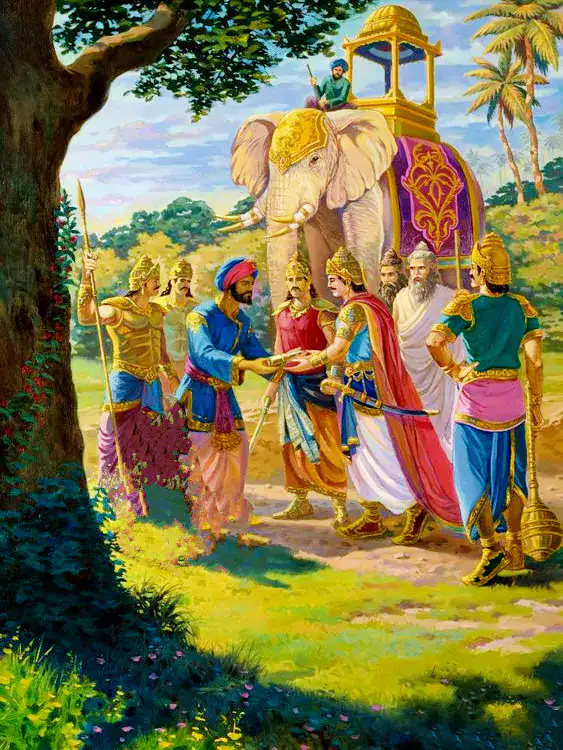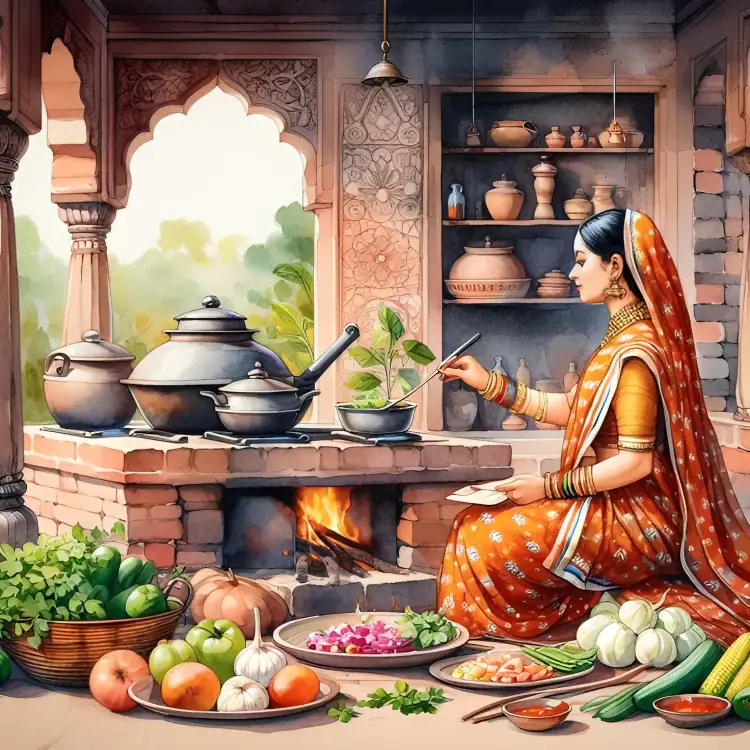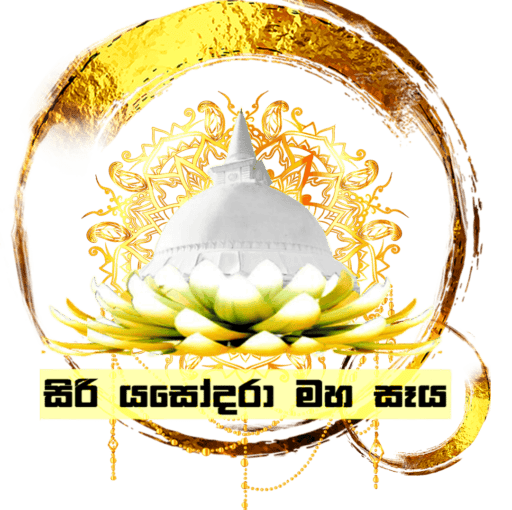Uttarā Nandamāta
During the time of the Buddha, she was born to a slave’s family in Rājagaha, as the daughter of Puṇṇa, who were household servants to Sumana the householder in Rājagaha.
Puṇṇa’s Ascendancy
It was a festive occasion in Rājagaha on account of the auspicious day, according to the planets. Sumana the householder of Rājagaha called Puṇṇa and said:
“O man, Puṇṇa, attending the festivities on this auspicious day and keeping the Uposatha precepts are actually matters that should not concern poor folks (like you). Yet, I am going to give you an allowance for this festive day, and you may either go and enjoy yourself at the festival or do your ploughing as usual. Just let me know whichever you choose.”
Puṇṇa replied: “Master, let me first consult this matter with my wife.”
At home, Puṇṇa told his wife about what his master had said him. She said:
“Dear husband, the householder is our master. Whatever the master says to you is to be taken as justified. But I think you ought not to miss a day’s work for him.”
And Puṇṇ, agreeing with his wife’s suggestion, yoked his oxen and went to the field to do the ploughing.

-
Save
It so happened that on that great day for Puṇṇa, the Venerable Sāriputta, after rising from his absorption in the attainment of Cessation, reviewed the world as to who deserved his blessing. He saw the ripening of Puṇṇa’s past merit as sufficing condition for understanding the noble Dhamma. So taking his alms-bowl and great robe at the time for alms-round, he went to the place where Puṇṇa was ploughing. He stood at a short distance where he could be seen by Puṇṇa, who, on seeing him, stopped ploughing and went near him and made his obeisance with five-fold contact. The Venerable Sāriputta, wishing to do good to the poor man, looked at him. Puṇṇa thought that the Venerable wanted to wash his face, and so he made a toothbrush out of a creeper nearby and gave it to him. While the Venerable was brushing his teeth, Puṇṇa took the alms-bowl and water-strainer and fetched a bowl full of fresh clear water, which was properly strained.
After washing his face, Venerable Sāriputta went on his way to collect alms-food. Then, it occurred to Puṇṇasīha thus:
“The Venerable had never come this way before. He came today probably to bring benefit to me. Oh, if my wife had brought my meal, how good it would be to offer it to the Venerable!”
Puṇṇa’s wife remembered that it was an auspicious day according to the planets. She had cooked a meal early in the morning with the ration which she received and carried it to her husband. On the way, she saw Venerable Sāriputta coming (going in his alms round) and thought to herself:
“On the previous days, I did not have anything to offer to the Venerable although I saw him, or when I had something to offer I did not meet him. Today, I have both the gift and the donee at hand. I will cook another meal for my husband and offer this meal to the Venerable now.”
Thinking thus, she put her cooked rice into the Venerable Sāriputta’s alms-bowl and made her wish, saying:
“May we be free from this life of poverty.”
The Venerable responded: “May your wish be fulfilled,” showing appreciation and returned to the monastery.
(Herein, it may be noted that in performing a deed of merit there arise many impulsion thought processes of great merit, each consisting of seven meritorious ‘impulsions’ or sub-moments of the thought process. If conditions are favourable, the first of these seven impulsions brings immediate result even in the very present existence.
Four present conditions must be there for such immediate resultant, namely, (a) the donee is an arahat, (b) the gift is something righteously obtained, (c) the donor has a strong will or volition in making the gift, i.e. his intention is intense before the act, during the act, and he feels glad for it after the act, (d) the donee has just arisen from dwelling in the attainment of Cessation. And above all, there must be sufficient past merit in the donor. In the case of Puṇṇa and his wife, all the required present and past conditions coexisted. His past merit to make him a rich man was ripe, so, on that very day, he reaped a harvest of solid lumps of gold from the field he was ploughing. This elevated him to the status of the Rich Man as conferred by the King.)
Puṇṇa’s wife returned home (without proceeding to her husband) and cooked another meal for her husband, and brought it to him. Fearing that her husband might be angry, (and more so because his anger would nullify the good consequence of her good act), from distance she began with some palliative words, saying:
“Dear husband, I would request that you restrain yourself from anger for today.”
“Why?” asked her husband (wondering).
“Dear husband, I met the Venerable Sāriputta on my way and offered him your meal; I had to go home and cook another meal for you. That is why I am rather late today.”

-
Save
Clods of Earth turn into Lumps of Gold
Puṇṇa said to her: “Dear wife, you have done the most pleasing thing. I myself had offered tooth-brush and fresh water for washing his face early this morning. So, for this day, every need of the Venerable has been supplied by us!” The couple was elated about their good deeds.
Puṇṇa then had his meal. After that he took a nap with his head on his wife’s lap. On waking up, he saw all around him, where he had ploughed, a sea of yellow objects somewhat like the yellow flowers of the sponge gourd profusely scattered about. Surprised, he asked to his wife:
“Dear wife, what are those things?” Directing his finger to those yellow objects (which were clods of earth): “Everywhere I had turned, the earth look like gold!”
His wife said: “Dear husband, perhaps you are having a hallucination after your hard work.” But Puṇṇa insisted:
“Look, look there yourself!” And she looked and exclaimed:
“Dear husband, what you said is true. Those things do look like gold!”
Puṇṇa stood up and picking up a clod of the yellow earth, struck it against the shaft of his plough. It was a soft lump of gold and stuck to the shaft like a lump of molasses. He called and said to his wife, showing a sample of gold:
“Dear wife, other people have to wait three or four months to reap what they sowed. For us, our meritorious deed, sown on the fertile soil, that is, the Venerable Sāriputta, had now brought us this harvest. Throughout this field of about one kiriya (1¾ acres) there is not a piece of earth the size of a myrobalan fruit which has not turned into gold.”
“What should we do about this?” his wife asked.
“Dear wife,” Puṇṇasīha replied, “we cannot hide this amount of gold.” So saying, he picked up clods of earth, filled the vessel, which was used to carry his meal, with lumps of gold. He went to the palace and showed it to the King.
King: Where did you get these gold from?
Puṇṇa: Great King, the field I ploughed today has been turned into clods of gold. May the King send his men to confiscate them.
King: What is your name?
Puṇṇa: Great King, my name is Puṇṇa.
Then the King ordered his men to yoke carts and go and collect the gold from Puṇṇa’s field.
The King’s men collected the clods of gold, saying:
“This is what the great past merit of the King has brought into being.”
The gold clods instantly changed back into clods of earth! Not a piece of gold was collected by them. They reported the matter to the King. King Bimbisāra told them:
“In that case, O men, say: ‘This is what Puñña’ s great past merit has brought into being,’ when you pick up those clod.”
The men went back, said the words as instructed by the King when collecting the gold and successfully obtained the gold.
The clods of gold, taken in many cartloads, were piled on the main square of the palace. It heaped to the height of that of a Palmyra tree. The King summoned merchants and asked:
“Whose house in the city holds a pile of gold as big as this?”
The merchants answered: “Great King, there is no house that holds this much gold.”
The King further asked: “What should we do with Puṇṇa, who is the owner of this gold?”
The merchant unanimously replied: “Great King, that Puṇṇa should be given the title of Royal Treasurer.”
The King agreed. And so Puṇṇa became the Royal Treasurer. All the gold gathered was handed over to him. On that same day, Puṇṇa’s inauguration as Royal Treasurer was held in high ceremonial state.

-
Save
Puṇṇa, now the Royal Treasurer, held a grand celebration on that auspicious acquisition of the royal title for seven days, by honouring the Buddha and His Sangha with magnificent offerings. On the seventh day, after hearing the Buddha’s sermon in appreciation of his great charity, all the members of his family, Puṇṇa, his wife and their daughter Uttarā, were established in the Fruition of Stream-Entry.
This is the story of Puṇṇa, one of the five great rich men within the dominion of King Bimbisāra who had inexhaustible resources.
The union of the Puṇṇa’s family with the Sumana's family, who were Non-believers
Sumana the householder of Rājagaha, on learning that Puṇṇa had a grown-up daughter, sent messengers to ask for the hand of his daughter in marriage to his son. Puṇṇa gave a flat refusal. Sumana was furious.
“That fellow who had been dependent on me now disdains me because he has become a great man,” he thought, conceited as he was of his own wealth. He sent this view of his to Puṇṇa through messengers. Puṇṇa was not to be outdone. He explained to Sumana’s messengers:
“Your master is being arrogant. Even though what he says is a fact, he should remember that a man should not be expected to always remain poor because he was born poor. Now, I am wealthy enough to buy householders like Sumana as my slaves. But, I do not say this in derogation of his lineage. I still honour him as a worthy householder.
My point is, my daughter is a devoted noble disciple of the Supreme Buddha. She, every day, makes an ample amount of offerings to the Triple Gem (the Buddha, the Dhamma & the Sangha). In such situation I cannot send my daughter to the house of a non-believer like Sumana.”
When Sumana learnt the adamant stand taken by Puṇṇa, he changed his tone. He sent words to Puṇṇa, saying:
“I do not wish to break old ties of friendship. I will see to it that my daughter-in-law gets the chance of making offerings to the Buddha everyday.”
Puṇṇa, being a man who knew the value of gratitude, agreed to Sumana’s proposition and sent his daughter in marriage to Sumana’s son.
Uttarā’s Great Faith in Religious Practice
One day, Uttarā said to her husband:
“Dear husband, in my parents’ house I observed uposatha precept eight days every month. If you may agree, I would do that here too.”
Although she made her proposition in gentle words, her husband bluntly refused it. She had to put up with the refusal meekly. At the beginning of the rains-retreat period, she sought his permission again to keep the uposatha during the three-month period. Again she received the blunt refusal.
When two and a half months had gone by and only fifteen days were left of the vassa (rain-retreat) period, Uttarā asked her parents; ‘why they had given her in marriage to this family rather than killing her, its completely like a caged bird the life he spends with that non-believer’s family.’
Learning of their beloved daughter’s pitiful condition, Puṇṇa and his wife became so upset. Immediately, they thought of a plan. Puṇṇa sent his daughter a pouch of fifteen thousand gold coins, saying,
“My dear, use this money and hire that famous courtesan Sirima for the purpose of serving your husband as a (hired) wife. Manage time for observing the uposatha and attending on the Triple-gem thus.”
Uttarā was impressed and soon sent for Sirimā, the famous courtesan in Rājagaha (who was the sister of Jīvaka the physician) and said to her:
“Dear Sirimā, as I intend to keep the uposatha for fifteen days, I would request you to attend on my husband during these days for a fee of fifteen thousand gold coins.”
Sirimā accepted her offer. Uttarā’s husband was only too happy about this arrangement and allowed her to keep the uposatha for fifteen days.
Having obtained her husband’s permission, Uttarā went about her meritorious deeds freely. She prepared food offerings for the Buddha early in the morning, assisted by her servants. After making offerings to the Buddha, and when the Buddha returned to the monastery, she kept the uposatha and would stay upstairs alone, reflecting on her moral precepts. Fifteen days passed peacefully.

-
Save
In the morning of the first waning of the last month of the three-month period, the day on which her observance of the uposatha was to end, she was preparing gruel and other items of food for offering to the Buddha. She was busy with the job since early morning.
At that time, the householder’s son, having fun with Sirimā on the upper storey of the mansion, drew aside the lace curtain of the window and looked down into the inside of the house. At the same time, Uttarā happened to look up at the window. The husband smiled with the thought:
“This Uttarā is looking like a being from niraya. How odd of her to deny herself the luxury of her status and toil herself unnecessarily (in the kitchen) mingling with the servants.”
Uttarā also smiled with the thought: “This son of the householder, being forgetful, thinks that this life of ease and comfort is lasting.”
Sirimā, who saw the couple smiled at each other, became furious with jealousy.
“This slave, Uttarā, is flirting with my husband even in my presence,” she thought to herself (for she had now an illusion that she and the householder’s son were real husband and wife).
She ran down the stairs, fuming. Uttarā understood that Sirimā had, after half a month of dominion of the house, considered it as her own. So, she entered into the jhāna of universal goodwill (loving-kindness) and stood sedately. Sirimā, rushing through the servants, took hold of a ladle, filled it with boiling oil from a pot which was cooking over the fire, and suddenly poured it over Uttarā’s head. But, since Uttarā was dwelling in the thoughts absorbed in goodwill, and since her whole body was diffused with loving-kindness, she did not feel the heat of the oil which flowed over her body like water onto a lotus leaf.
At that moment, Uttarā’s servant accosted Sirimā with abusive words, saying:
“You slave woman, you are a mere hireling of our Mistress. Yet after staying in this house for just fifteen days you try to rival our Mistress.”
These words awakened Sirimā to her true position. She realized that she had gone too far. She went to Uttarā, fell on her feet, and apologized from her, saying:
“Dear Madam, I had been reckless in my behaviour. please….. do forgive me!”
Uttarā replied: “Dear Sirimā, I cannot accept your apology now. You must first obtain forgiveness from my father, the Buddha, before I can forgive you.”
Just then, the Buddha and His company of bhikkhus arrived and sat in the seats prepared for them. Sirimā approached the Buddha and prostrating herself at His feet, said:
“Venerable Sir, I have done some wrong against Uttarā. I apologized from her for it and she says that I must first obtain forgiveness from the Bhagavā before she would forgive me. May the Bhagavā , the Supreme Buddha forgive me.”
The Buddha said: “Sirimā, I forgive you.” Then she went to Uttarā and made obeisance to her as a token of her apology.
The Buddha, in His discourse in appreciation of the food offering, uttered the following verse:
“Conquer the angry one by loving-kindness;
Conquer the wicked one by goodness;
Conquer the stingy one by generosity;
Conquer the liar by speaking the truth.”
——Dhammapada, verse 223——
At the end of the discourse, Sirimā was established in the Fruition of Stream-Entry. After the attainment of ariyahood, she invited the Buddha to her residence the next morning and she made great offerings to the Buddha and His Sangha.
Thus goes the story of Uttarā the householder’s daughter, who also was known as Nanda’s mother after she gave birth to a son by the name of Nanda.
On one occasion, when the Buddha was residing at the Jetavana monastery naming distinguished female lay-disciples, He declared:
“Bhikkhus, among My female lay-disciple who dwell in jhāna (who practice jhānas), Uttarā, the mother of Nanda, is the foremost.”
(From the book : The Great Chronicle of Buddhas | by Ven. Mingun Sayadaw)
